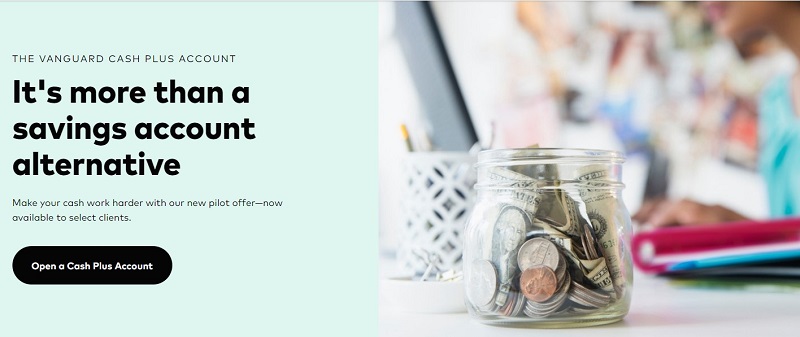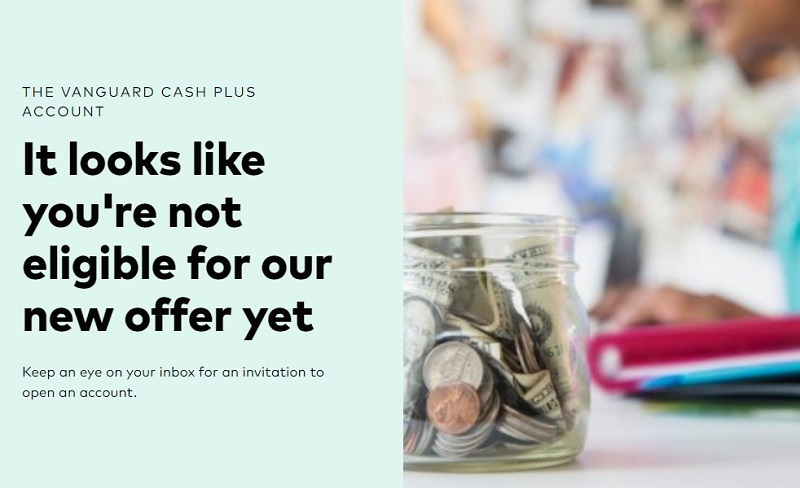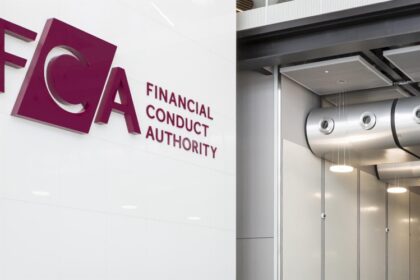Vanguard Cash Plus Account
![]()
Product Name: Vanguard Cash Plus Account
Product Description: The Vanguard Cash Plus Account is a high interest rate cash management account that does not offer a debit card or checks. You can access funds via ACH transfers.
Summary
Vanguard has offered a new cash management account that could be a good option for those who aren’t satisfied with existing options at Vanguard. The rate is competitive when compared to money market funds but you can do better with high yield savings elsewhere.
Pros
- Competitive APY
- Cash accessible via transfers
- No fees (with e-delivery)
Cons
- No debit card
- No checkwriting
The Vanguard Cash Plus Account is a cash management account from investment advisory firm Vanguard. It’s similar to a high-yield savings account in that it offers above-average interest rates with low fees, but it’s not the same as a typical bank account. For example, you cannot access funds with a debit card or checks; you must use an ACH transfer.
At A Glance
- 4.15% APY
- No monthly fees
- No minimum balance requirement
- No withdrawal limits
- Eligible for FDIC coverage of up to $1.25MM ($2.5MM for joint accounts)
Who Should Use a Vanguard Cash Plus Account?
The Vanguard Cash Plus Account is ideal for existing Vanguard investment clients who want to store their cash and short-term savings while keeping the money with Vanguard. Having the ability to keep your money in the cash sweep account or transfer it into five available Vanguard money market funds gives you more options than a single savings account. And having access to up to $2.5MM of FDIC coverage means that the account is suitable for investors with large savings balances.
| Monthly Fee | $0 | $0 | $0 |
| Savings APY | 4.81% APY | 4.35% APY | up to 4.80% APY (minimum balance requirements for higher rates) |
| Min. Balance to open | $500 | $100 | $0 |
| Learn More | Learn More | Learn More |
Table of Contents

What Is the Vanguard Cash Plus Account?
The Vanguard Cash Plus Account is a cash management account similar to what firms like Betterment offer. It includes a bank sweep that transfers your cash into a network of partner banks. This is how it’s eligible for FDIC insurance. In addition to the bank sweep, you can access 5 Vanguard money market funds.
Cash Plus benefits include a yield of 4.15% APY and no fees (if you elect e-delivery of documents, otherwise $25 per year). While you can’t access your cash with a debit and there are no check writing privileges, you can make as many withdrawals as you want. Vanguard provides account holders with routing and account numbers so you can set up direct deposit, pay bills, and make payments through apps such as PayPal, Cash App, and Venmo.
At one point, the Cash Plus Account was a limited offering, but it’s now here to stay. According to Vanguard, the company will continue to add more features.
Who are Vanguard’s Partner Banks?
They provide this list of partner banks:
- Valley National Bank
- Bank of Baroda
- First Foundation
- Citibank, N.A.
- CIBC Bank USA
- NexBank
- Synchrony Bank
- American Express
- Synovus Bank
- The Huntington National Bank
- Truist Bank
- State Street Bank and Trust Company
- HSBC Bank USA, N.A.
- UBS Bank USA
You can opt out of specific banks by calling 800-242-7455 – (a nice touch!)
I Am Now Eligible!
When I first reviewed this account back in August of 2023 when it was in the pilot stage, I was not eligible.

Then, on the final day of April 2024, Vanguard sent me this email with the unnecessarily cryptic subject line, We noticed you looking our way:

It looks like I can open one!
Normally, I don’t just click on links in emails (phishing attempts are rampant), but this was to my secret email address so I was confident it was safe. It took me to the genuine Vanguard website.
I just logged into my account, and it started going through the Vanguard account opening process, which I hadn’t done in ages. I was surprised it didn’t take me through a custom flow just for the Cash Plus Account.

You have to select a goal, account owner, and then pick the type of account. On this screen (see below), you can select an Individual Cash Plus Account:

I made it all the way to the end when I decided, no thanks. The current yield is 4.50% APY (Sep 1, 2024), which isn’t that appealing.
It’s not high enough that I’d move money into it from somewhere else. And all my accounts use VMSXX as their settlement account and it gets 3.57% APY but I almost immediately re-invest the money or transfer it out to an account that yields a comparable rate to the Cash Plus.
How Does This Compare?
Cash management accounts are always tricky to compare because they live in a weird spot between different types of deposit accounts. The main appeal is that they offer high yields while still being linked to whatever fintech offers, so you can hold some of your money as cash without transferring it out of the service.
In this case, it’s a brokerage.
But most brokerages have other options for holding cash and Vanguard’s settlement fund is already attractive. VMFXX is the Vanguard Federal Money Market Fund and acts as the sweep account on my brokerage accounts – so all cash automatically goes into that fund.
The yield is 4.87% (7-day SEC yield as of 9/27/2024, w/ 0.11% expense ratio). Also, you can get check writing privileges on VMFXX if you want.
If you compare it with Fidelity, they offer a Fidelity Cash Management account with a paltry 2.72% APY as of August 30, 2024. But you get a debit card, which makes it more like a checking account, and that yield is pretty good for a checking account. Vanguard Cash Plus is better than Fidelity but slightly worse than VMFXX.
If you look at other companies that have offered cash management accounts, like Betterment or SoFi®, they’ve all taken steps to become banks. They no longer offer cash management accounts and have gone entirely into checking and savings accounts. The ability to access your cash through a card is appealing.
Vanguard Cash Plus vs. Alternatives
For many, the best alternatives to the Vanguard Cash Plus are high-yield savings accounts because they offer comparable yields, low fees, easy access to cash, and are easy to open. If you’re looking for a high-yield savings, here are some top accounts worth considering:
Western Alliance Bank
Western Alliance Bank is well-regarded for its small business and commercial banking products and services. However, it also offers personal banking accounts, including its Premier High-Yield Savings Account. This account pays an attractive yield and has no monthly maintenance fees. However, there is a $500 opening balance requirement. Learn more in our full review of Western Alliance Bank.
CIT Bank
CIT Bank is a digital bank offering several deposit accounts, including checking, high-yield savings, money market, and certificates of deposit (CDs). The high-yield savings account has no monthly fees, but there is a $100 minimum opening deposit. While the account offers an attractive yield (5.00% as of August 31, 2024), it’s only earned on $5000 or higher balances. Up to $5,000, it’s a much more pedestrian 0.25%.
Learn more in our full review of CIT Bank.
Barclays
Barclays is a London-based international bank. In the U.S., it offers online savings and CD accounts. Its high-yield savings account is currently paying 4.20% APY. While that’s a bit lower than Western Alliance and CIT Bank, there is no minimum deposit amount, nor are there any monthly fees.
Learn more in our full review of Barclays Bank.
FAQs
Is the Vanguard Cash Plus Account a limited promotion?
No. The account was part of a pilot at one time, but according to Vanguard, it now has a permanent place in its product lineup. In fact, the company claims that it will be adding new features to improve the account over time.
What Is a money market fund?
A money market fund is a low-risk mutual fund that typically invests in highly liquid short-term debt instruments, such as Treasury bonds and CDs.
Can you use an ATM card with the Vanguard Cash Plus Account?
No, you cannot use an ATM card to access cash from a Vanguard Cash Plus Account. You can transfer funds using payment apps such as PayPal, Venmo, and Cash App.
Why does Vanguard partner with banks for the Cash Plus Account?
Vanguard isn’t a bank, so it can’t offer FDIC insurance on customer deposits. Using a bank sweep in partnership with FDIC-insured financial institutions means that Vanguard clients can access this valuable coverage without opening a bank account elsewhere.
Summary
Since it’s just a cash management account with an 4.15% APY, The Vanguard Cash Plus Account is just a more restrictive high-yield cash-equivalent account.
You’re better off opening a high-yield savings account, which often provides higher yields. And with those accounts, you can transfer funds into certificates of deposit with the same banks to squeeze even greater yields.
Vanguard’s Cash Plus Account falls into the “nice to have” bucket, but it is not something I need in my life right now.
Other Posts You May Enjoy:
Addition Financial Credit Union Bonus: $50 / $100 Checking
Florida-based Addition Financial Credit Union has a modest bonus offer that is only available to the residents of a few select Florida counties.
What is Portfolio Diversification?
Diversification can you help you maximize your investment returns while lowering your risk. Diversification isn’t just owning more funds or stocks, it’s a specific way of thinking about your allocation so you are taking the right risk.
What is the 20-4-10 Rule?
Do you know how much you should be spending on a car? The 20-4-10 rule can help you figure out what you can comfortably afford based on your income.
Is the 4% Cash Back U.S. Bank Smartly Visa Signature Card Worth It?
U.S. Bank is set to release a credit card that offers 4% cash back if you meet certain requirements. Is the U.S. Bank Smartly Visa Signature Card worth the effort it takes to get 4% cash back?

About Jim Wang
Jim Wang is a forty-something father of four who is a frequent contributor to Forbes and Vanguard’s Blog. He has also been fortunate to have appeared in the New York Times, Baltimore Sun, Entrepreneur, and Marketplace Money.
Jim has a B.S. in Computer Science and Economics from Carnegie Mellon University, an M.S. in Information Technology – Software Engineering from Carnegie Mellon University, as well as a Masters in Business Administration from Johns Hopkins University. His approach to personal finance is that of an engineer, breaking down complex subjects into bite-sized easily understood concepts that you can use in your daily life.
One of his favorite tools (here’s my treasure chest of tools, everything I use) is Empower Personal Dashboard, which enables him to manage his finances in just 15-minutes each month. They also offer financial planning, such as a Retirement Planning Tool that can tell you if you’re on track to retire when you want. It’s free.
Opinions expressed here are the author’s alone, not those of any bank or financial institution. This content has not been reviewed, approved or otherwise endorsed by any of these entities.







